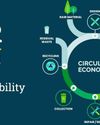7TH EDITION OF TANTU SEMINAR
Textile Value Chain
|October 2019
DISCUSSED ON INDIGO DYEING, DENIM FINISHING AND SUSTAINABILITY IN JEANS MANUFACTURING
-

TANTU has successfully concluded its 7th Annual Seminar on the 14th of September at India International Centre, New Delhi, India. The seminar was dedicated to highlighting the problems in the jeans manufacturing industry and the jeans market and to creatively suggest effective solutions in the key areas.
Jeans being a classic has become an integral part of mankind and is likely to stay that way. The reason could be its adaptability. Jeans can be incorporated in our looks in several ways be it in terms of colors, lengths, fits and styles. The popularity of the fabric and the garment is expected to rise, let alone decrease. The 7th seminar of Tantu aptly emphasizes this.
In his welcome speech, Dr. Prabir Jana, the president of TANTU, addressed the history of TANTU and the role it intends to play in the Textile and Apparel industry. Tantu seminars serve the purpose of bridging the gap between the problem experiencers and the solution providers. It stands as a platform to take up the issues and have experts from various backgrounds deliberate over the cause and effects of such issues in the industry. Unlike most forums, TANTU believes that a panel discussion is the right way to confront the problems and deduce solutions. The technicalities of the process that makes a product has been the key area of discussion.
Mr. Sunder Belani, Managing Director, Ramsons, the title sponsor expressed that unlike popular belief that there is a decline in business, there is a change in the way of doing business. There is a shift in the demand towards sustainability. There ingenious one stop laundry solutions incorporate high tech ozonators and nanotechnology. There Laser Tex and Jet spray Vertostar machines have successfully reduced the water required to wash denim from 60 tonnes to 10 tonnes.
Dit verhaal komt uit de October 2019-editie van Textile Value Chain.
Abonneer u op Magzter GOLD voor toegang tot duizenden zorgvuldig samengestelde premiumverhalen en meer dan 9000 tijdschriften en kranten.
Bent u al abonnee? Aanmelden
MEER VERHALEN VAN Textile Value Chain

Textile Value Chain
EPR in Textiles: Turning Compliance into Opportunity
When the EU Comes to Panipat, It Means One Thing — The World Is Watching
3 mins
November 2025

Textile Value Chain
European Parliament Delegation Visits Panipat Recycling Cluster to Strengthen India-EU Collaboration on Circular Textiles
A high-level delegation from the European Parliament's Committee on International Trade (INTA) visited the Panipat Textile Recycling Cluster — India's largest hub for recycled textiles and circular manufacturing — during their official visit to India.
1 mins
November 2025

Textile Value Chain
Paramount Instruments: Where Innovation Turns Testing into Joy
At Paramount Instruments, innovation isn't just a Pursuit- it's in our DNA.
2 mins
November 2025
Textile Value Chain
Crafting the Future: LMW & Hami Weavelon pioneer Compact Spinning in Polyester
Manmade fibres today form the backbone of the global textile industry, driven by their versatility, performance, and ability to meet the rising demand for both everyday and specialised applications.
3 mins
November 2025

Textile Value Chain
Data is the New Thread: Weaving India's Textile Sector into a Circular Powerhouse
On November 13, 2025, at the 12th Edition of the India and Sustainability Standards (ISS) International Dialogue and Conference held at Bharat Mandapam in New Delhi, representatives from the Home Exporters Welfare Association of India (HEWA) joined industry leaders, policymakers, and international organizations to address a pressing question: How can India's textile sector meet emerging global data requirements while supporting its MSME backbone?
3 mins
November 2025

Textile Value Chain
Rieter Winding Suction Nozzle Upgrade: More Yarn, Less Energy Use
After upgrading the suction nozzles on their 32 winding machines, Sanyang Textile Co., Ltd., China, saw an increase in yarn production of 3% and a reduction of 13% in energy use. The flow-optimised, aerodynamically designed suction nozzle enables efficient upper yarn search and pickup from the package. This results in a 55% reduction in red light percentage and a significant reduction in the operator's workload.
1 mins
November 2025

Textile Value Chain
EU's Extended Producer Responsibility (EPR) Law and Its Implications for India's Textile Industry
The European Union (EU) has approved a new Extended Producer Responsibility (EPR) framework for textiles. This is a major regulatory shift that makes fashion brands and producers accountable for their products' entire lifecycle, from design and production through collection, sorting, recycling and disposal.
9 mins
November 2025

Textile Value Chain
GTE Ahmedabad 2025 Concludes Day 3 with a Huge Footfall
The 38th Garment Technology Expo (GTE) Ahmedabad 2025, co-located with the Lace & Trims Show, wrapped up its third day on an impressive note, recording around 9,700 B2B visitors. The strong industry turnout reaffirmed the expo's role as one of the most influential and business-driven platforms for garment and apparel technology in the western region.
2 mins
November 2025

Textile Value Chain
Reinterpreting Korean Street Fashion through Sustainable Design Practices
A Path through Eco-conscious Urban Fashion
7 mins
November 2025

Textile Value Chain
3D Printing in Textiles Manufacturing: A Game-Changer in Design, Sustainability, and Efficiency
The global textile and apparel industry is undergoing a radical transformation due to the convergence of digital design, advanced material technology, and next-generation manufacturing. Of the latter, few have greater potential to change how textiles are made today than additive manufacturing, better known as 3D printing.
5 mins
November 2025
Translate
Change font size

